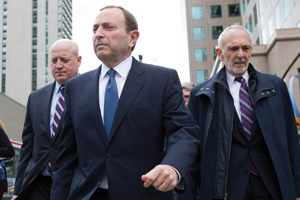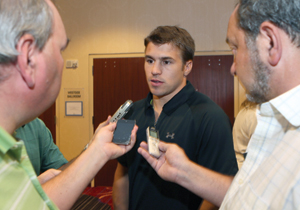Gary Bettman, seeking to cheer up a friend, called a commissioner who had just been fired.
It was 1999, and Doug Logan had been relieved of his duties by his bosses, the nine owners of the franchises of Major League Soccer. Bettman, then in his sixth year as commissioner of the NHL, lightened the mood for Logan.
 |
Bettman (center), leaves the NHLPA offices in New York City with Deputy Commissioner Bill Daly (left) and lawyer Bob Batterman after a recent round of bargaining.
Photo by: AP IMAGES
|
“Doug, we both know that as a commissioner, at any given moment, you can have eight or nine owners at your throat,” Bettman told Logan. “Your problem was, your league only has nine owners.”
Logan laughed then, and he laughed again recounting the story last week. He knows that Bettman, the architect of the current NHL lockout now in its second month, is in the eye of the storm while players, fans and NHL commentators question his judgment.
Such questioning is by no means unique for a commissioner in the midst of a labor fight. The past two years have seen the same for David Stern in the NBA and Roger Goodell in the NFL. Unique for Bettman is that this is his league’s third lockout in 18 years and the second in eight years. The expected passing late last week of the league’s deadline to save a full, 82-game season (no new collective-bargaining agreement had been reached at press time) was serving to add to the anger, frustration and criticism surrounding the NHL and its leadership.
Buffalo goaltender Ryan Miller, perhaps most visibly, recently posed the question that highlights the increasing scrutiny of Bettman’s stewardship: “Gary has basically run this business for 20 years,” Ryan told reporters in New York after negotiations stalled last month. “So if he’s operated at a loss for how many of those years, how is he still in a position of leadership, or even have a job?”
Octagon agent Allan Walsh, a persistent critic of Bettman’s, struck a similar chord last week. “The writing is on the wall,” said Walsh, whose clients include Pittsburgh goaltender Marc-Andre Fleury. “Every sports commissioner has a certain shelf life, and Bettman’s has expired. We all know the lockout will end at some point, but Bettman has become such a toxic commodity for the game, it’s untenable after three lockouts that he be the person to grow revenues in partnership with the players going forward.”
But unlike Logan, Bettman — who answers to the owners of a 30-team league and has the support of an overwhelming majority of them — is not going anywhere.
 |
Zach Parise of the Minnesota Wild is among the NHL players who have spoken out about Bettman as the sides face off.
Photo by: GETTY IMAGES
|
“Gary’s in this for the long term,” said Harvey Schiller, the former president of the Atlanta Thrashers and now chairman and CEO of GlobalOptions Group, a risk management and business solution company in New York. “He has majority support of ownership. Gary has made a commitment to them and they have made one to him.”
Those involved directly in the league’s business aren’t willing to speak publicly on the ongoing talks nor on Bettman’s legacy, for fear of fine or rebuke. Bettman declined to comment last week on what this latest round of labor strife means for him — either in the short term (including his relationship with the players) or in the long term and his steering of the league.
Many who are willing to share thoughts do so only with a request for anonymity. Included among them is one former NHL club governor who said, looking all the way to the possibility of a lost second season, “For the sake of player and fan relations, I don’t know how Gary could come back from that. He’s the first commissioner to cancel one entire season. But two — two in the last decade [if that were to happen]? No matter how brilliant Gary is, I don’t know how he could be the voice of management anymore.”
He could do so, of course, if that is the owners’ will. Like all commissioners, Bettman serves at the owners’ request — and there’s little reason to think, according to most sources contacted for this story, that Bettman’s status will change any time soon.
Bettman in November 2010 received a five-year contract extension from the NHL’s board of governors. According to the league’s latest tax filing, Bettman made more than $7.98 million in salary and bonuses during the fiscal year ending June 30, 2011.
That deal came more than five years after arguably the NHL’s low point: the cancellation of the entire 2004-05 season, the result of the second lockout of Bettman’s tenure. But while a season was lost, the lockout did produce a labor deal seen at the time in many corners as a large win for the owners.
The NHL labor fight has seen more than a few players making comments about league commissioner Gary Bettman. A sampling:
“ You’ve got a guy in Gary Bettman bragging every year that we’re making ‘record revenue, record revenue, record this,’ and all of a sudden they want to take a quarter of what you’ve made away. That doesn’t make sense to anybody. It doesn’t matter what industry you’re in.” (Aug. 27)
— Minnesota Wild forward Zach Parise
“
The thing that is frustrating for us as players is this is the third time the players have been locked out by Gary Bettman and the owners. When I look at that, the first thing I think is that it shows a lack of respect for the fans.” (AskMen, Sept. 30)
— Toronto Maple Leafs forward
Joffrey Lupul
“
He is certainly the NHL’s most hated person.” (Salama, Selanne’s Finnish blog, Sept. 16)
— Anaheim Ducks forward
Teemu Selanne
“
We want to play, we’re the ones who are doing the show in the NHL, but Bettman thinks [it’s him]. It is unfortunate that the NHL have such a guy. It’s a shame for the entire hockey world. [He] treats us like animals.” (ESPNNY.com, Oct. 22)
— Boston Bruins center David Krejci
“
We’ve all heard that Gary thinks the fans don’t matter; they’re gonna be back whenever we need them. I think that says it all right there.” (CSNPhilly.com, Aug. 30)
— Philadelphia Flyers center
Danny Briere
“
I wonder how many blocked shots, hits, fights, stitches, broken bones, concussions, and surgerys gary has had?” (@BrandonPrust8, Aug. 13)
— Montreal Canadiens forward
Brandon Prust
The league’s need to reset that system now has less to do with anything Bettman did to allow the system to fail, in the eyes of many, than with how the owners have run their teams since that deal took effect.
The eve of this latest deal’s expiration, for example, saw owners offering players high-dollar deals for terms longer than the league’s own proposed new labor agreement. Such deals, in many corners, are the kind of actions that run counter to any big-picture, best interests of the league than any moves made directly by Bettman since 2005.
A date perhaps even more critical is 1993. That’s when Bettman was hired. He joined the league with a deal he negotiated that says his removal requires approval by no less than three-quarters of club owners. Bettman also wrote the legislation that gives him significant power during collective bargaining. The commissioner is allowed to reject any CBA proposals by the NHL Players’ Association with only eight votes from the 30 owners.
This helps explain why some experienced executives feel certain Bettman will be around for a while, no matter when and how the lockout might end.
“This is a man who has his critics,” said Logan, the former MLS commissioner who later was CEO of USA Track and Field, “but they don’t include the people who are his bosses.”
Said Schiller: “If the owners thought they should make a change, they would have made it before these CBA negotiations. Throughout the talks, Gary has acted as someone completely in charge, someone who knows he’ll be in his position for a while.”
Bettman’s advocates point to the many highlights of the 60-year-old commissioner’s stewardship. Among them are the development of the NHL Winter Classic and Canada’s Heritage Classic as touchstones of the league’s big-event strategy; expansion to the South, with two franchises in Florida and others in Carolina, Dallas and Nashville; the 10-year, $2 billion deal signed with NBC last year; and a record $3.3 billion in reported league revenue last season.
“Gary has brought us into the 21st century with a great deal of vigor,” said Boston Bruins Chairman Jeremy Jacobs, in June. “Gary has the support of all 30 clubs. We all believe in his direction.”
During each of the lockouts of Bettman’s tenure — 1994-95 (which resulted in a 48-game schedule), 2004-05 and today — Bettman has been the face of management to players and fans. Although Bettman, Deputy Commissioner Bill Daly, outside counsel Bob Batterman and league staff devise the collective-bargaining strategy, they work for the owners of the 30 NHL clubs.
Experienced league-side executives refuse to count out Bettman, no matter how long this third lockout drags on.
Robert Caporale, an alternate governor for the Pittsburgh Penguins from 1991-97, said much the same. “Gary has to lead 30 owners who, quite frankly, are not used to being led in their other businesses,” said Caporale, now chairman of Game Plan, the sports and entertainment investment banking and consultant services firm. “Ultimately, this lockout is on the owners and players. If another season is lost, Gary should not be held responsible.”
That’s seen as the case no matter the vitriol toward Bettman in these recent weeks and months. To that end, the NFL and NBA lockouts brought frequent and heavy criticism of Goodell and Stern from the players of those leagues, and while some argue those relationships have not returned to any level of pre-lockout collegiality (particularly in Goodell’s case), all parties have returned to business — whether that means playing the game or managing the operation.
Don Meehan, president of the player representation agency Newport Sports Management, believes NHL players will be civil toward Bettman and continue to promote the league’s brand whenever a new deal is reached.
“I would think that players would be able to put aside their personal feelings and understand that both Gary Bettman and [NHLPA Executive Director] Don Fehr are retained to do a difficult job,” said Meehan, whose agency represents NHL stars Steven Stamkos, Henrik Lundqvist and Jarome Iginla, among others. “In CBA negotiations, there are times when the issues allow one to be emotional and frustrated. But we have to accept and understand that is part of the process. When it is all said and done, we have to have professional respect for each other.”
Scott Rosner, an assistant professor in legal studies and business ethics at the Wharton Sports Business Initiative at the University of Pennsylvania, similarly said that whenever the NHL reopens, even the harsh words of Buffalo’s Miller will be forgotten.
“Players are rarely happy with the commissioner,” Rosner said. “It would be odd if they were. As much as they want to say they’re partners, the owners and players are on opposite sides of the table. Bettman should have no trouble resuming his day-to-day role as commissioner because, in reality, he doesn’t work for the players and fans. He works for the owners.”





